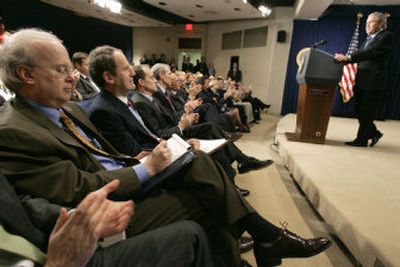Bush, Rove stay upbeat about election

WASHINGTON – Amid widespread panic in the Republican establishment about the coming midterm elections, there are two people whose confidence about GOP prospects strikes even their closest allies as almost inexplicably upbeat: President Bush and his top political adviser, Karl Rove.
Some Republicans on Capitol Hill are bracing for losses of 25 House seats or more. But party operatives say Rove is predicting that, at worst, Republicans will lose only 8 to 10 seats – shy of the 15-seat threshold that would cede control to Democrats for the first time since the 1994 elections and would likely hobble the balance of Bush’s second term.
In the Senate, Rove and associates believe, a Democratic victory would require the opposition to “run the table,” as one official put it, to pick up the necessary six seats, a prospect the White House seems to regard as nearly inconceivable.
The Mark Foley page scandal and its fallout have many Republicans panicked, but Rove professes to be taking it in stride. “The data we are seeing from individual races and the national polls would tend to indicate that people can divorce Foley’s personal action from the party,” he said in a brief interview Thursday.
The official White House line of supreme self-assurance comes from the top down. Bush has publicly and privately banished any talk of losing the GOP majorities, in part to squelch any loss of nerve among his legions. Come January, he said last week, “We’ll have a Republican speaker and a Republican leader of the Senate.”
The question is whether this is a case of justified confidence – based on Bush and Rove’s electoral record and knowledge of the money, technology and other assets at their command – or of self-delusion. Even many Republicans suspect the latter. Three GOP strategists with close ties to the White House flatly predicted the loss of the House, though they would not do so on the record for fear of offending senior Bush aides.
Bush’ s unpopularity has made House and Senate campaigns think twice about using him.
“You have to be careful where you take him,” said an adviser to a GOP candidate in a close Senate race. In the past, this source said, the White House usually dictated where the president went. “They are probably more cooperative. They will go into the places and formats we suggest,” he added.
To Rove and the small cadre of operatives who have been at his side throughout the administration – including Republican National Committee Chairman Ken Mehlman and White House political director Sara Taylor – confidence flows from a conviction that a political operation that has produced three consecutive national victories is capable of one more, despite voter disaffection with Iraq and GOP scandals in Washington.
So far, there have been few surprises revealed in the Bush-Rove playbook, which seems little changed over the past four years. It includes tapping the powers of incumbency, mobilizing Christian conservatives and others in the GOP base and seeking to polarize the electorate around national security and taxes. A massive effort to raise money by Bush, Vice President Dick Cheney and first lady Laura Bush seems to be paying off: By Taylor’s calculation, the various GOP campaigns and party committees will have a $55 million advantage in the final three weeks of the campaign.
The RNC is also planning another big get-out-the-vote drive in the final three days before the election. Rove believes many of the polls in individual House and Senate races understate what he expects to be a GOP advantage in turnout, according to one party strategist who has heard him discuss the midterms.
Taylor, an Iowa native and protegee of Mehlman’s, said the administration recognized long ago that this would be a difficult campaign, coming in the sixth year of a presidency. “History suggests this will be a tough year for us,” she said. “But at some point the weight of our structural advantages makes up ground. And the message is really more important than all of that. When it comes to the war on terror, people have confidence in the policies that are keeping the country safe.”
Polling suggests that might be changing – the recent Washington Post-ABC poll found 53 percent of Americans disapprove of Bush’s handling of terrorism, the lowest number he has received on what has been a signature strength. But in every campaign appearance, Bush continues to bang away at Democrats for being purportedly soft on national security.
Recent events combined to change the campaign conversation. These include the leak of a classified intelligence document suggesting the Iraq war was complicating the fight against terrorism, a Bob Woodward book alleging administration deceptions about the war and – perhaps most critically – the Foley scandal, which raised questions about whether the GOP tolerated abuse of minors to protect one of its own.
Nonetheless, White House officials say the president plans to use the final weeks of the campaign to try to reshape the national agenda and to help as many candidates as he can.